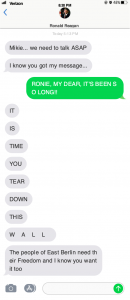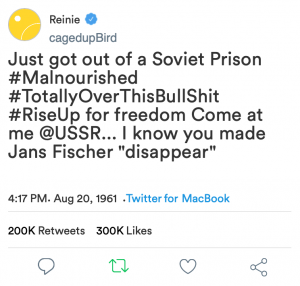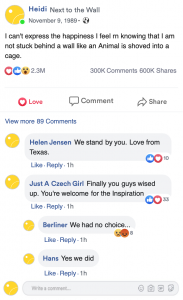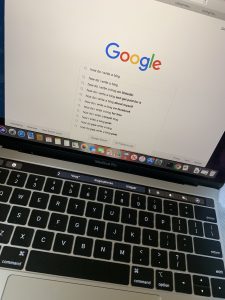*This DCI assignment asked for us to suggest a work of fiction that we would assign for the next class and why it is relevant to our class.*
Every ounce of technological advancement our society seems to “discover,” is just an intense form of understanding the limitations of humans. I went to a talk at my school on Roboethics by Ronald Arkin where he mentioned that when he study robots he really is on the quest to ultimately solve: what makes us human?
The three works of fiction that stood out to me all dive into the issues of being human.
The first work of fiction I would highly recommend is the Twilight Zone episode “I Sing The Body Electric” (Season 3 Episode 35). https://www.youtube.com/watch?v=EQyLupktgRs (here is a link to about 5 minutes from the beginning).
Without spoiling too much of the episode, a father losses his wife and is raising their three children by himself. The children’s Aunt Nedra believes that the children need guidance that the father cannot provide. Although the father protests and says he can provide that guidance to his own children, Aunt Nedra passes by the children and expresses her sadness to them. This sparks the father to reconsider that he can provide his children love, but he cannot be with them all the time. The son brings a magazine named Modern Science, that has an ad for I Sing The Body Electric machine that mimics an elderly woman. The rest of the episode dives into what happens to the family when the two younger children create a machine that is eerily alike to their dead mother. Does Grandma (the machine) have the ability to raise the children like a human would? Does the Grandma love the children? Is the Grandma truly a gentle machine or just programmed to be gentle? Is it possible to have a gentle machine that is truly selfless? There’s so many questions this episode can produce. I was attracted to how similar it was to the somewhat recent movie Ex Machina that looks into the selfishness of humans and AI. Both looked into the Turing test, which asks the participant to determine using a very specific set of procedures whether the other participant behind the screen is a robot or a human. I’m oversimplifying the whole test, but it’s a relevant question especially now that AI can now walk like humans and look like us. I would assign this episode (which is about 25 minutes long) along with a reading about the Turing test and Sophia the AI that goes to UVA. I would ask the students if this episode paints the Grandma more human-like or less human-like? And I would ask if the Grandma would pass the Turing test or fail it. Furthermore, I would conclude asking the students what does this episode tell us about humans and our need for guidance, attention and love. The graded assignment would be just the discussion questions and the worksheet.
You could also show them the 1981 Electric Light Orchestra song, “Yours Truly, 2095” in class. This song may seem a little random, but it displays the singer writing a letter to a past human lover talking about all the technology he is experiencing. Furthermore, it sounds like the singer is talking about a robot that is suppose to remind him of the human lover, but he finds it difficult to really erase the human lover from his mind. https://www.youtube.com/watch?v=mb5TV7JUvzo (again a link to this song). The whole song is a take on what the 21st century would be like now that technology is improving exponentially. I would have them either pull out a section of the song that they thought showed the singer’s mixed feelings about the robot the best or have them make a skit or song depicting themselves writing a letter to a human about some technological advancement in the near future. I also really like this song, because it deals with the Turing test and whether Robots can fill the void that loneliness creates. But then again, I’m pretty biased, because ELO is one of my favorite bands.
The second piece of fiction I was considering was another Twilight Zone episode, “ A Thing About Machines” (Season 2 episode 4). This one is hard to describe without spoiling or imposing my own theories, but here I go. A man has problems with technology and grows more paranoid about technology as he notices his new devices turn on by themselves. The reason why I like this episode is it dives into whether technology is an extension of our mind and fears. * SLIGHT SPOILER AHEAD * We find out that the man is a practicing “Sophisticate” who cannot control technology nor people despite attempting to do so. His whole life seems fake and manufactured. One comment it definitely had was that technology has the ability to mimic our mind and expose our own emotions. For instance, the man calls some ladies to have dinner with him, because he doesn’t want to be alone, but he discovers things about their lives which shakes him from his fantasy. The ending is a classic Twilight Zone cliff-hanger, which would provide for an interesting discussion. I think you could throw this episode with a reading about technology’s effect on our mind, mental health and how anxiety impacts our usage of technology. For the graded assignment, I would just have the students write about their interpretation of the ending and whether it shows that technology is part of the human mind or whether technology is just a distraction for our mind.
The last piece of fiction is the Black Mirror episode, “Hang the DJ” (Season 4 Episode 4). This one deals with a girl named Amy and a man named Frank who are paired up with this device that guarantees matching you up with the one. In order to get the 99.8% accuracy that the device claims to produce, you have to go through multiple dates with the system in order for the system to gather better data on what you like and what you don’t like. Throughout the episode, it throws in social commentary about hook-up culture, relationships, love, and online dating. Considering online dating has become more popular, I thought it would be interesting to discuss how accurate online dating can be? Are we going towards online dating because it simplifies going through the process by yourself? How has technology impacted the way we form relationships with people? It also merits how accurate data can be. The ending was also really wild, but again that would be a major spoiler if I made a comment on it. Again I would just put it with the readings and discussion questions. Maybe even throw in a blog post about what you would have done if you were placed in the system where everything is planned by data.





